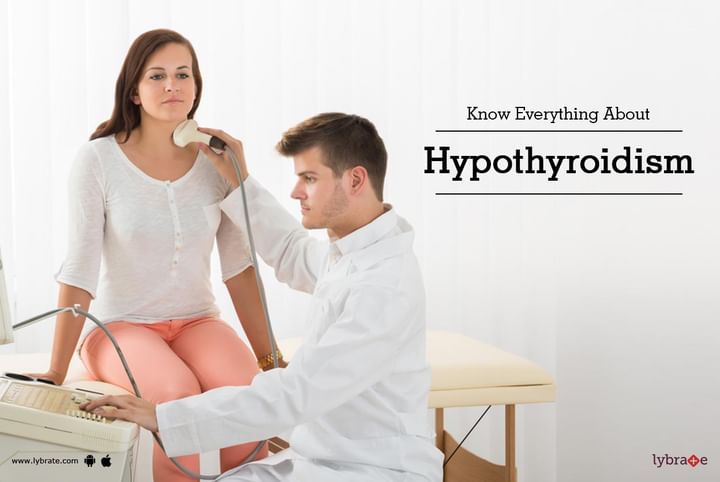Know Everything About Hypothyroidism
Hypothyroidism is a condition in which the thyroid gland is not producing the thyroid hormones adequately. This is a fairly common condition.
What is thyroid gland?
The thyroid gland is a small butterfly-shaped gland located just below Adam’s apple. It encircles the windpipe or the trachea. It is about 4 cms in height and weighs about 18 gms. This gland is responsible for the secretion of thyroid hormones. Hormones are chemicals produced by special glands like thyroid, adrenals, ovaries etc. They act as messengers and are carried by the blood to the various target organs.
What are the hormones produced by thyroid gland and what do they do?
The thyroid hormones are of two types – T3 (Tri iodo thyronine) and T4 (Thyroxine). These hormones are mainly responsible for the body’s metabolism - a process in which food is converted into energy in the cells. They influence growth and development and regulate various bodily functions which are mentioned below:
- Heartbeat
- Body temperature
- Breathing
- Body weight
- Metabolism of fat
- Menstrual cycles in females
- Functioning of Nervous system
- Digestion
- Burning calories etc.
What is Hypothyroidism?
Inadequate production of hormones by the thyroid gland is termed as hypothyroidism. This is also called Underactive thyroid state. Hypothyroidism can make the body’s development to slow down and reduces metabolism rates.
What are the causes of Hypothyroidism?
Hypothyroidism can be caused by a number of factors:
- Hashimoto's thyroiditis: This is the commonest cause. This is an autoimmune disorder (normally body’s defence system fight against external infections. In autoimmune disorder the defence system attacks the healthy cells of the body by mistake). In Hashimoto’s thyroiditis the immune system/defence system produces antibodies that attack the thyroid gland and destroy it.
- Iodine deficiency in diet. For the production of thyroid hormones iodine is very important. The body does not produce iodine normally, so it needs to be supplemented from outside. Iodine is mainly present in the food we eat. It is mainly present in shellfish, salt-water fish, eggs, dairy products. If a person does not eat iodine rich foods, he may end up with iodine deficiency leading to hypothyroidism. Currently, this causative factor is on the decline due to government initiative of table salt with iodine.
- Surgery: Surgery to remove thyroid gland (for e.g. thyroid cancer treatment, overactive thyroid etc.)
- Radiation to the neck (to treat cancer in the neck area): The thyroid gland cells are damaged due to the radiation.
- Treatment with radioactive iodine: This treatment is used for managing hyperthyroidism/overactive thyroid, where the thyroid gland produces excessive thyroid hormones. One of the treatment modalities is by radioactive iodine. Sometimes this radiotherapy destroys normal functioning cells which lead to hypothyroidism.
- Certain medicines: Certain medicines used to treat heart conditions, cancer, psychiatric conditions etc. – for e.g. amiodarone, lithium, interleukin-2, interferon-alpha.
- Pregnancy: Pregnancy (the reason is unclear but it has been noticed that the thyroid may get inflamed after delivery – this is called Postpartum thyroiditis.
- Damage to the pituitary gland: Pituitary gland is a gland which is present in the brain. It produces a hormone called TSH (Thyroxine-Stimulating hormone).The TSH tells the thyroid gland how much thyroid hormone it should make. If the levels of thyroid hormone in the blood are low, then the TSH will stimulate the thyroid gland to produce more Thyroid hormone.
- Hypothalamus disorders: This is an organ in the brain. This produces a hormone called TRH (Thyrotropin Releasing Hormone) which acts on the Pituitary gland to secrete TSH. So any disorder of Pituitary gland will indirectly effect the production and secretion of Thyroid hormones. These are very rare disorders.
- Congenital thyroid defects: Some babies are born with thyroid problems. This is due to the thyroid not being developed normally during pregnancy. Sometimes the thyroid gland does not function normal. This can be identified by screening for thyroid disorders in the first week after delivery. This is usually by a blood test using a small drop of blood from the baby’s heel.
What are the different types of hypothyroidism?
One classification is based on whether the defect is with the thyroid gland or not:
- Primary hypothyroidism: The problem is in the thyroid gland itself and thus there is reduced production /secretion of thyroid hormones.
- Secondary hypothyroidism: Here the problem is with the Pituitary gland or the Hypothalamus. This results in abnormal production of TSH or TRH, which indirectly leads to less production and secretion of thyroid hormones.
Another classification is based on the symptoms and levels of the thyroid hormones and TSH:
- Overt hypothyroidism: Here the patient is having the symptoms. Further the T3/T4 are low and TSH is high
- Subclinical hypothyroidism: Here patient may or may not have symptoms. The T3/T4 levels are normal but TSH is high. In this situation the patient is at an increased risk of developing overt hypothyroidism in the future especially if he has Thyroid peroxidase antibodies on testing.
Who are at risk of developing Hypothyroidism?
- Women have a higher risk of suffering from hypothyroidism than men.
- Older people are at increased risk.
- People suffering from other autoimmune diseases like Coeliac disease, Type-1 Diabetes Mellitus, Vitiligo, Pernicious anemia, Multiple sclerosis, Rheumatoid arthritis, Addison’s disease etc.
- People with psychiatric conditions such as bipolar disorder
- People with Chromosomal abnormalities like Down syndrome, Turners syndrome also have a high risk of suffering from hypothyroidism.
What are the symptoms of hypothyroidism?
Symptoms vary from person to person. They may also mimic other conditions and hence be difficult to diagnose. Symptoms may also develop very slowly over a span of moths-years. Some of the characteristic symptoms of this disease are:
- Depression
- Constipation
- Hair loss
- Dry hair
- Dryness of the skin
- Tiredness
- Body pains
- Fluid retention in the body
- Irregular menstrual cycles
- Increased sensitivity to cold
- Reduced heart rate
- Increase in size of the thyroid gland – called Goitre. This is due to constant stimulation of the thyroid gland by TSH.
- Weight gain
- Carpal tunnel syndrome
- Hoarse voice
- Infertility
- Loss of libido/sex drive
- Confusion or memory problems especially in the elderly
What are the symptoms to look for in a baby if you suspect hypothyroidism?
Infants suffering from congenital hypothyroidism may show no symptoms or exhibit signs of excessive drowsiness, cold hands, cold feet, constipation, hoarse cry, poor growth or absent growth, poor appetite, bloating of abdomen, puffiness of face, swollen tongue, persistent jaundice.
How to diagnose hypothyroidism?
Blood tests:
- TSH: This hormone is made in the pituitary gland and it stimulates the thyroid gland to produce thyroxine. If the thyroxine levels are low in the blood, the pituitary gland produces and secretes more TSH into the blood to act on the thyroid gland to produce more thyroxine. A raised TSH level indicates hypothyroidism. Other tests are not usually necessary unless a rare cause of hypothyroidism.
- T4: A low level of thyroxine indicates hypothyroidism.
- T3: these levels are generally not needed to diagnose hypothyroidism
- Anti-Thyroid peroxidase antibodies (anti-TPO antibodies) or Anti- thyroglobulin antibodies are present in 90-95% of patient with autoimmune thyroiditis.
- Other blood tests include Creatinine Kinase, Serum Lipids, Complete blood picture etc.
- Ultrasound of the neck is done if the patient presents with a thyroid swelling.
What is the treatment of hypothyroidism?
Overt hypothyroidism is treated by synthetic Thyroxin hormone which should be taken every day on an empty stomach at least 30 – 45 minutes before breakfast. The treatment is continued for the rest of the patient’s life. Regular thyroid function tests are done once every 8 weeks-12 weeks to adjust the dose of the thyroxine in the initial period of diagnosis. Once the thyroxine dose is stabilised, the tests can be done even once a year. This treatment is quite effective.
Sub-clinical hypothyroidism is only treated if the patient is a woman and is contemplating pregnancy, in patients with symptoms or if the TSH is quite high.
What are the side-effects of thyroxine medication?
There are few side effects if any. Most people tolerate these medications quite well. An important consideration before starting medication is to check if the patient has chest pain/angina. These people are started on the least available dose. If these patients are started on a higher dose they notice a worsening of their angina pains.
Side effects mainly occur if the thyroxine dose is high which leads to hyperthyroidism. The symptoms of this could be palpitations 9increased heart beat), weight loss, profuse sweating, anxiety, irritability etc.
There are some tablets which increase with thyroxine tablets. These include carbamazepine, iron supplements, calcium supplements, rifampicin, phenytoin, warfarin etc.
What are the complications of hypothyroidism?
If untreated hypothyroidism can lead to:
- Heart problems like heart attack due to increased levels of bad cholesterol like LDL, or heart failure due to fluid retention
- Obesity
- Infertility
- Joint pains
- Depression
- A pregnant woman with hypothyroidism is at increased risk of giving birth to a baby with congenital hypothyroidism, also known as cretinism. Further, the woman may have pregnancy related complications like pre-eclampsia, premature delivery, low birth weight baby, anemia, post-partum haemorrhage (bleeding after delivery) etc.
- Myxoedema is another complication where the patient has extremely low levels of thyroid hormone. The body temperature drops drastically making the person lose consciousness or go into a coma. If you wish to discuss about any specific problem, you can consult an endocrinologist.



+1.svg)
